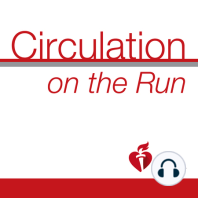16 min listen
Circulation August 13, 2019 Issue
ratings:
Length:
23 minutes
Released:
Aug 12, 2019
Format:
Podcast episode
Description
Dr Carolyn Lam: Welcome to Circulation On The Run, your weekly podcast summary and backstage pass to the Journal and its editors. We're your cohosts. I'm Dr Carolyn Lam, associate editor from the National Heart Center and Duke National University of Singapore. Dr Greg Hundley: And I'm Greg Hundley, associate editor from the Poly Heart Center at VCU health in Richmond, Virginia. Carolyn, oh, this is going to be an exciting featured article today, and we're going to discuss the combination of agents or their administration et al that are best suited for managing both anticoagulation and antiplatelet therapy and those with coronary disease, peripheral arterial disease and heart failure. And, we'll speak with Dr Kelley Branch from the University of Washington. Dr Carolyn Lam: And me! Dr Greg Hundley: Yes. How am I going to interview you? And, we'll discuss the utility of Rivaroxaban with or without aspirin in patients with heart failure or peripheral arterial disease from the compass trial. Dr Carolyn Lam: Well, I'm not going to let you get there until I tell you about this first basic paper I've chosen because it focuses on the unfolded protein response. Dr Greg Hundley: What's that? Dr Carolyn Lam: Well, Greg, I was really hoping you'd ask. The unfolded protein response is a cellular adaptive process to cope with protein folding stress. Now, approximately 40% of human proteins are predicted to be either transmembrane or secretory. The synthesis, the folding, the cellular transportation and location of these proteins rely on proper functioning of this secretory pathway. Numerous studies have established that the unfolded protein response plays versatile roles during development and under physiologic and pathophysiologic conditions. However, the role of this unfolded protein response in the regulation of cardiomyocyte growth is unclear. Dr Greg Hundley: That's fantastic, Carolyn. I've already learned something here. So, what did this paper show? Dr Carolyn Lam: This is from Dr Wang and colleagues from UT Southwestern, and basically, they use both gain and loss of function approaches to genetically manipulate spliced X-box binding protein one or XBP1, which is the most conserved signaling branch of the unfolded protein response in the heart. In addition, primary cardiomyocyte cultures were employed to address the role of XBP1S in cell growth in a cell autonomous manner. They found that XBP1S expression was reduced in both human and Rhode and cardiac tissues with heart failure deficiency of XBP1S lead to decompensation and exacerbation of heart failure progression under pressure overload. On the other hand, cardiac restricted over expression of XBP1S prevented the development of cardiac dysfunction. Mechanistically, they found that XBP1S stimulated adaptive cardiac growth, your activation of mechanistic target of rapamycin or MTOR signaling which is mediated via the FK-506 binding protein 11, which is a novel transcriptional target of XBP1S. So in conclusion, this study really showed a critical role of the XBP1S FKB or FK-506 binding protein 11 and MTOR axis in coupling the unfolded protein response and cardiac cell growth regulation. Dr Greg Hundley: Boy Carolyn, you explained that so well, and I learned a lot from that. I hope I can do as well with this next article from Professor Johann Backs from the University of Heidelberg. Now paradoxically, some glucose lowering drugs have been shown to worsen heart failure, raising the question of how glucose mediates protective versus detrimental cardiac signaling, and this study from his group focused on one of the class two histone deacetylases or HDAC's namely HDAC-4, which functions as an important epigenetic regulator by responding to upstream stress signals, and linking them to downstream gene regulatory programs involved in among other things, metabo
Released:
Aug 12, 2019
Format:
Podcast episode
Titles in the series (100)
Circulation June 6, 2017 Issue: Circulation Weekly: Your Weekly Summary & Backstage Pass To The Journal by Circulation on the Run
